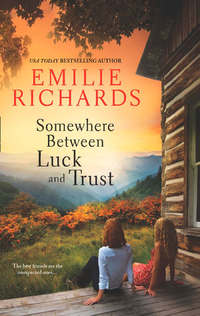
Полная версия
The Swallow's Nest
She was still furious, but fury had never worked in her favor. She didn’t let it show. “I’m sorry.”
He ran his hand over his wet hair, leaving tracks where his fingers plowed through it. “You’re the first good thing that’s happened to me in a long time.”
“I like being your good thing.”
“Don’t you dare stay away.”
She thought about how not staying away would make his overbearing sons feel, and she had to work hard not to smile. “Then I won’t. I definitely won’t.”
“I was thinking in the shower. Can you take at least one day off so we can go somewhere for a long weekend? We could get a flight to Las Vegas, see a show, have some great meals?”
She had been to Las Vegas—hadn’t everybody? But she’d gone for one night on a budget, eaten at cheap buffets and played the penny slots.
She didn’t have to think. This was her chance to do everything differently. “I’ll see what I can do. I might be able to take a day without pay.”
“That job of yours is going to be a hurdle.”
“Maybe I’ll quit someday.” She hugged him hard, but her mind was on other things. Like how she could use his sons’ anger against them. Like how her life could change for the better and quickly.
Then she thought of Toby. If she had kept him, she wouldn’t have this chance. She had traded her son at least partly for Blake, but maybe it was going to work out best for everybody.
“Stranger things have happened,” she said. “Someday I just might quit. Who knows?”
11
At age ten Lilia had fallen in love with her aunt’s “nest.” She’d stepped out of the taxi on her first visit to her grandparents and aunt in San Jose, and the tiny house had beckoned to her and whispered “home.” In those days the stucco exterior had been pale gray and the trim charcoal. Unkempt evergreens had flanked the house and hidden the lower panes of windows. As she and her mother walked up a crumbling concrete sidewalk, Nalani told her that while Auntie Alea could still walk, keeping up with the house was difficult now that she had Parkinson’s, and hard, too, for Lilia’s grandparents, who had moved from Kauai to help.
“It doesn’t matter what shape the house is in, because Auntie Alea will never leave,” her mother added. “Leaving would kill her faster than any disease. She loves her nest the way I love my children. And while we’re here, we’ll do everything we can to make it a happy place for her.”
Now, as Lilia stood at the curb after saying goodbye to the driver who had picked her up at the airport, she remembered how she had felt that day. While her brothers were completely content living where they had been born, she had known immediately that when she grew up, she would live on the mainland. And while the boys and her cousins had taken their turns helping an increasingly fragile Auntie Alea when their grandparents went home to Kauai, Lilia had come most often, until the day she’d moved in permanently to attend San Jose State.
Even if she had hated San Jose she would have come to help her aunt, who by then was wheelchair bound. That’s what family did. But from the beginning she had known just how lucky she was to be here. The city, and particularly Willow Glen, felt like home.
It still did.
Twilight deepened as she gazed up at the house, in no hurry for what lay ahead. Her aunt had left her cozy little nest to Lilia just months before Lilia married. Her brothers and cousins had received money and stock, but nobody questioned the reason Lilia was given the house. Everyone knew Auntie Alea had left it to the one person who loved it as much as she did, and would keep it in the family.
She came from strong, solid people, people who, when decisions were made, thought about what was best for everyone. They trusted each other and the future they would share, even when things went wrong.
Her trip home had been a reminder of that strength, and her own strength was beginning to return. But still, the decision to come back today had been the hardest of her life.
The moon was coming up over the house, bathing it in silvery light. After their marriage Lilia and Graham had lovingly restored and renovated, and finally built the addition to ensure they could live here forever. Despite living in much more extravagant houses all his life, Graham loved it as much as she did. When property values increased, when he found a better investment or a more prestigious location, Douglas Randolph had moved his family. Unlike any house Graham had lived in with his parents, this one had love and family woven through every room.
Together they had added their share.
She wasn’t sure what she was going to say to him tonight. Two weeks had passed since the moment Marina thrust Toby into her arms and disappeared. Regan had been short on particulars, but she had said that Toby was still living with his father. Whether Marina was back in the picture was a mystery, as were details about how Graham was managing.
As a child, when a night was hot or something particularly bothered her, Lilia had gone out to her family’s lanai, sometimes to find a brother in one of the lounge chairs, too. She had slept better there, as if she’d nestled into the loving arms of Papahanaumoku, the earth mother, who with her sky husband, Wakea, was the ancestor of all people.
Here in Willow Glen, when she and Graham had added the master bedroom suite upstairs, she’d done her best to replicate that feeling, insisting on skylights so she could see the stars, and cross-ventilation so she could feel the breeze.
But last night back on her family’s lanai, she had made a decision.
Before going inside she allowed herself one more look at the house. How many times had she changed the color of the door, the trim, even the stucco? The wisteria vine running along the eaves was finally coming into its own after years of training and nurturing. The walkway no longer led straight to the door, and perennials bloomed in the curves. Except for the beds of old roses rimming the back patio, everything she planted was drought resistant and colorful. And during the driest season, she’d been known to catch buckets of “greywater,” the water that normally ran down the drain as her morning shower warmed, to soak the roses.
The house belonged to her, and most likely since it was hers before marriage, even with California’s community property laws, it would remain hers in a divorce.
Not for the first time she wondered how much worse Graham’s death would have felt than his betrayal.
Lights were beginning to flick on in houses, but not in hers. The porch light was off, and none of the windows were lit. If Graham was home, he was doing a good job of hiding it. She had no idea what she would walk into, but she was about to find out.
On the porch she unlocked the door, then gathered herself and went inside, pulling her carry-on behind her. The downstairs wasn’t completely dark; the light on the microwave glowed softly from the kitchen, and light shone through windows where shades hadn’t been drawn. She left her suitcase and shoes by the door and walked through the familiar rooms to the staircase.
Graham hadn’t wasted their time apart cleaning. Dishes lay on the dining room table, still dotted with food. In the kitchen more were piled in the sink, and unopened mail, magazines and keys littered a counter. She wondered if he had given up hope she would be returning soon, or if he just expected her to clean up after him when she did. More likely he just hadn’t given her reaction any thought. And that seemed like a bad sign.
She was halfway up the stairs when she heard a wail. Not a loud one, more the sound of an infant just waking, or one who had worn himself out with louder cries. At the top of the stairs she listened and realized the sound was coming from the small bedroom they used for guests. Someday they had hoped to use it for a nursery.
The door was open, but the light was off. She didn’t need light, though, to know the room was now occupied. Toby was in the nursery they had planned for their own child. She hadn’t considered the possibility, but it stabbed her now. Toby was not their child. He belonged solely to Graham and the woman he had impregnated. And now his baby was firmly implanted in the room, in the dream she had shared with him. A dream of a baby they had created together.
She didn’t go inside despite continued wailing. Toby was Graham’s to care for. She walked slowly down the short hall to the master bedroom. The door was open, and here, at last, was light shining from two lamps and spilling brightly from the connecting bathroom. Graham, fully dressed, was facedown on the bed, as if he had collapsed there because he didn’t have the strength or energy to strip off his jeans and slide between the sheets.
For a moment she wondered if he was breathing. She held her own and watched until she could make out the steady rise and fall of his back. She wondered how long he had lain that way, clearly so exhausted he couldn’t do anything but sleep. Even quiet, cheerful babies took enormous energy. Constant feeding and diapering and toting from one place to another. After an evening of babysitting she had always been relieved to give infants back to their parents. She’d loved the cuddling, the nurturing, the singing of lullabies, but she had also felt drained.
How much more drained was a man who had just endured a year of cancer and chemo? Considering the state of the downstairs, no one else was helping. From all the signs, Graham had been on his own.
One part of her felt sympathy, another thought he deserved exhaustion. Graham hadn’t asked for cancer, but he had asked for his son.
The wailing was louder now. So the baby wasn’t giving up; he was just getting started. And Graham? Graham was sleeping too soundly to hear him.
Lilia knew she should wake him. A part of her was ready and willing. She could tell him she would be downstairs in the sunroom when and if he got Toby back to sleep. She almost did both.
Instead she found herself in the hallway again, and this time she entered the room where the cries were growing louder and louder and stood in the doorway. The shades weren’t drawn. A street lamp was all she needed to see a crib had been installed in a corner, along with a changing table and a dresser. Everything looked brand-new and possibly expensive. She wondered which credit card Graham had used.
She nearly turned away, nearly went downstairs to let the baby cry and Graham sleep on until the cries woke him. But none of this was Toby’s fault. As angry as she was, as hurt, she couldn’t let a baby who had asked for none of this suffer. She padded slowly to the side of the crib and stood looking down at him.
Toby was so impossibly small. She always forgot how tiny babies were, how fragile. They had no defenses except their cries. And how sad, how forlorn he sounded, as if he believed that nobody cared about his distress, nobody even recognized it.
She scooped him into her arms before the desire to do so registered. He was so light. For a moment she wondered if she dropped him if he’d simply fly away, if his bones, like a bird’s, were hollow, and he would gracefully soar to the heavens.
Miraculously the cries stopped. In the lamplight she examined his face, and oddly, he seemed to examine hers. On that awful day she’d seen Graham in his features. Now she saw her husband again. Since the beginning of human reproduction fathers had seen themselves in babies that weren’t their own. But this was no mistake. She certainly didn’t see herself when she looked at Toby, but she did see the man she had married.
He whimpered, and without thinking she rested him against her shoulder. He squirmed, but he didn’t cry. She adjusted him so his face was turned toward hers, and he seemed to relax.
She wondered when he’d last eaten. Had he been hers she would have offered him a breast, sat in the corner rocking chair—and yes, she saw now that there was one in the corner away from the window—and sung to him as he nursed. But he wasn’t hers. She had no idea what Toby ate and when. She did know, though, that he was wet. The dampness was seeping through the little footie pajamas he wore.
As she changed him she murmured. Of course the wailing began again. Few babies enjoyed being changed. But she turned on a lamp so he could see her better and told him who she was as she stripped the pajamas off his impossibly tiny body and warded off the chill with a flannel blanket over his chest as she removed his diaper.
“I’m Lilia, Toby. And this is my house. I hope you never remember the day you arrived, because it wasn’t a good one for you or for anybody else.”
She wondered how true that was. Had it been a good day for Marina? Had she been so relieved that after she drove away she’d gone somewhere to celebrate?
She found wipes and cleaned him thoroughly, noting the beginning of diaper rash. Would Graham know it if he saw it? Wasn’t anybody helping who could point out the need to change Toby more frequently? Clearly the baby had sensitive skin, and despite a quick search through the changing table drawer, she saw nothing to relieve it.
Tomorrow she would shop.
That thought surprised and annoyed her. “Except that you’re not mine to worry about, are you?” Still pinning him to the table, she pulled dry pajamas from a drawer in the dresser. Somebody had folded and placed baby clothes in drawers. Somebody had made certain the dresser was an easy reach from the table.
She pulled the pajamas over the baby’s flailing arms, then scooped him up again and took him to the rocker, grabbing a blanket from the foot of the crib as she passed.
Seated, she tucked the blanket around him. “I guess we’ll find out if you were just wet or hungry.” A pacifier sat on the closest window ledge, and she tucked it into his mouth. Then she began to rock. He squirmed; he protested. But in a minute he began to settle.
“So I was saying...” She was surprised that her voice quieted him even more. “I’m Lilia. And you’re Toby. If I’m not mistaken you are now my stepson. What you are for sure is a surprise. What a way to start your little life, huh?”
One arm shot up, and he batted at her chest, surprising her. He was no longer crying. Now he was squinting at her, as if he was trying to figure out who she was. She remembered that babies saw faces, that faces intrigued them.
“I have four brothers. All but one of them have children. They’re a rowdy group, Toby. They would eat you alive. Then they would spit you out and teach you to surf and fish and hike up mountains.”
She wondered why she was telling him this, and she thought of Eli’s oldest son, the child who wasn’t his by birth, but was as much a part of their extended family as any other child.
Конец ознакомительного фрагмента.
Текст предоставлен ООО «ЛитРес».
Прочитайте эту книгу целиком, купив полную легальную версию на ЛитРес.
Безопасно оплатить книгу можно банковской картой Visa, MasterCard, Maestro, со счета мобильного телефона, с платежного терминала, в салоне МТС или Связной, через PayPal, WebMoney, Яндекс.Деньги, QIWI Кошелек, бонусными картами или другим удобным Вам способом.







